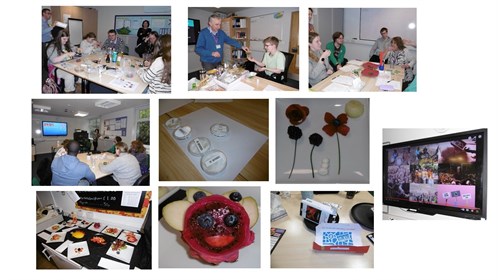Cambian Wing College ‘The Wonders of Food!’ Enrichment Day – 21/10/24
The inaugural enrichment drop-down day, held on October 21st, celebrated a theme that resonates with everyone – The Wonders of Food! Students participated in diverse workshops that delved into various facets of food, including its social significance, the impact of natural resources on human dietary patterns, sustainability, the interplay between our senses and hunger, the psychology behind eating habits, the history of the world's oldest condiments, and even a hands-on session creating edible art.
The world’s oldest condiments workshop started with a short introduction on condiments and how they can be used to enhance and enrich the flavour of food. We discussed our personal favourites and then considered the rich history of salt and pepper and how the use of each condiment has developed over time. We continued to look at the history of our more modern condiments, focusing in on ketchup and mayonnaise.
It was then time to don the aprons and develop the practical skills of how to make simple and quick ketchup and mayonnaise. We provided recipes with visual steps of how to make two of our most cherished condiments. We encouraged students to add a little spice and flavour to the traditional recipe, if they wanted to. We placed all the ingredients in the middle of the table and supported students to use hand blenders and food processors to get some truly excellent results.
Throughout the session we saw some wonderful co-operation between the whole group and great sharing of equipment and resources. Everyone seemed really pleased with their efforts. The evaluations of the session were really positive with unanimous agreement that they would make ketchup and mayonnaise again. Even when we tired our condiments against famous branded products, the homemade versions were still recommended.
Thank you to the students for their effort and enthusiasm and to the staff we had supporting, all of whom contributed to making the session a success. Hopefully an enriching and tasty experience for all! From the ‘well-seasoned professionals’, Sue and Gayle.
Extreme cuisine workshop explored the diverse culinary landscapes across continents, highlighting staple foods, extreme dishes, and delicacies. Each culture may classify similar foods differently; for instance, insects are considered a delicacy in some regions yet viewed as extreme in others. Additionally, human dietary adaptations for space exploration demand innovative approaches to nutrition, particularly in potential future colonies beyond Earth. Students were invited to examine the complexities of such culinary contrasts and the challenges of sustaining human life in extreme conditions.
The science of taste and smell workshop - the students discussed what they already knew and understood and came up with some interesting facts, ideas and suggestions as we explored the roles played by the tongue, nose and brain in identifying tastes and smells. The olfactory system has its own direct links to processing parts of the brain. Students were encouraged to explore the strong connections and associations between taste, smell and memory.
From a scientific viewpoint, we are detecting chemicals in our food and in the air. The tongue is covered in papillae each of which is home to different types of taste buds. When we breathe through our noses, the air-borne chemicals are picked up by receptor cells lining the nasal cavity. These have the amazing ability to distinguish up to 10,000 different smells or combinations of odour molecules.
Students conducted a simple investigation testing their own sense of smells and matching sample smells of common products / flavourings. The workshop explained how in reality the brain “constructs taste”. The mouth, nose and brain work together to produce flavour sensations.
The Social Aspect of Food workshop focussed on exploring how food helps in building social connections and how cultures differ in connecting via food. The workshop aimed at helping students understand what role does food and social eating play in their lives. It encouraged the students to reflect on their everyday life activities where they engage in social eating or prepare food for others. They could realise how food can be a conversation starter and help in decompressing of everyday stress/ pent up emotions. For example, when they go out with family/ friends for a meal or share a meal with them (every day or on special occasions). These are all ways of socially connecting via food which helps them become happier, satisfied, trusting, engaged in local community and have develop friendships. The students could also compare the importance of food in Indian and Italian culture with British culture by looking at a snapshot of experiences of people living in these countries.
The Future of Food workshop encouraged students to look more closely at their favourite meal and allocate 'climate points' to each of their ingredients. Students learned about and shared their opinions on new climate-friendly alternatives, such as lab-grown meat, insects and algae. Some students even tried a selection of salted critters - locusts, mealworms and crickets - which were met with mixed, but overall positive, reviews!
You are what you eat workshop – the students explored the differences in body shapes and discussed various diets. We examined the elements of a balanced diet and learned about the role of different nutrients in our development. Additionally, we looked at how certain foods can affect our mood and overall feelings, and help us to improve our brain functions.
The steep price of chocolate workshop centred on two topics related to the theme of chocolate. The first half of the session examined the financial concept of ‘inflation’; the rising cost of a ‘Freddo’ was used as an edible example for this. The focus then shifted to ‘Fairtrade’ where the class explored how purchasing Fairtrade chocolate can be highly beneficial for those who actually farm the cocoa. With plenty of samples to taste, we hope this session was as enriching as the chocolate was delicious.
Making food art workshop explored the art of food presentation, focusing on the harmonious combination of taste, smell, and sight. Participants have utilised readily available fruits and vegetables to craft imaginative displays that enchant the eye and entice the palate, transforming ordinary produce into extraordinary culinary masterpieces.

